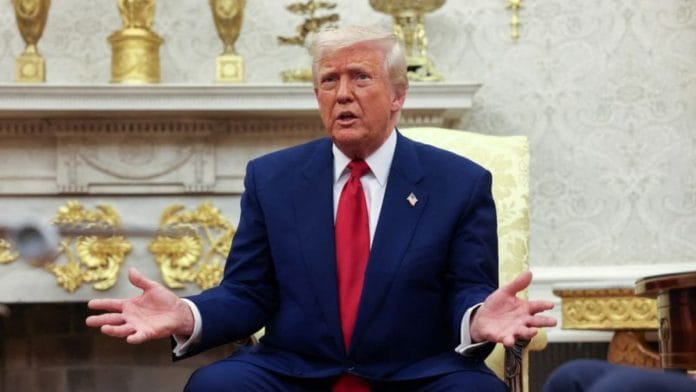New Delhi: The US administration continues to push India and Pakistan to engage in direct talks to maintain the current cessation of hostilities arrived at between the two countries, while pointing out that President Donald Trump is a “peacemaker” willing to aid nations in the pursuit of peace.
Thomas Pigott, principal deputy spokesperson of the US Department of State said during a press briefing Tuesday, “What I can say is reiterating what we’ve been saying for a couple days now is that we welcome the ceasefire reached between India and Pakistan this weekend and we commend both prime ministers for choosing the path of peace. The President Truthed about this. He was very clear in terms of that. We also want to encourage direct communication between the parties. That is something we’ve also been clear about as well.”
He added: “And when it comes to, again, solving conflicts that have existed in regions around the world, the President wants to solve those conflicts when he can. He’s often said that he stands ready to aid in the pursuit of peace; he stands ready to help. And the President is a dealmaker. He is a peacemaker.”
The comments come as the Trump administration continues to take credit for brokering the ceasefire between India and Pakistan. The tensions escalated on the border on 7 May, after India struck nine terrorist complexes within Pakistan and Pakistan-occupied Kashmir, in response to the 22 April Pahalgam terrorist attack. Islamabad’s military then retaliated, which led to a back-and-forth for three nights.
On the evening of 10 May, Trump posted on Truth Social that the US helped broker a ceasefire between the neighbours, before either New Delhi or Islamabad made any such announcement. Minutes later, Pakistan agreed to Trump’s characterisation of the agreement. India, however, has maintained that the agreement was achieved bilaterally between the Director General of Military Operations of both countries, with no third party mediation.
Randhir Jaiswal, the official spokesperson for the Ministry of External Affairs Tuesday said that India’s “force of arms compelled” Pakistan to back down. The American leadership did engage in conversations with leaders of both countries, with Rubio speaking to Indian External Affairs Minister S. Jaishankar twice between 8 May and 10 May, while Vice President J.D. Vance spoke with Prime Minister Narendra Modi on 9 May.
Rubio also spoke to Pakistan’s Prime Minister Shehbaz Sharif, Deputy Prime Minister and Foreign Affairs Minister Ishaq Dar, as well as army chief General Asim Munir. Since the bilateral understanding was achieved between India and Pakistan, Trump has taken credit for it, posting on social media on Sunday, while speaking about the US’ role on Monday and Tuesday.
“Just days ago, my administration successfully brokered a historic ceasefire to stop the escalating violence between India and Pakistan, and I used trade to a large extent to do it. I said ‘look fellas, let’s make a deal.’ Let’s do some trading. Let’s not trade nuclear missiles, let us trade the things you make so beautifully,” Trump said, addressing the Saudi-US Business Forum Tuesday evening.
The American president added: “They both have very powerful leaders, strong leaders, good leaders, smart leaders. It all stopped, I hope it remains that way. I was very proud of Marco Rubio and all of the people that worked so hard. J.D. Vance, Marco [Rubio]. Maybe we can get them together a little bit Marco [Rubio], where they go out and have a nice dinner. Wouldn’t that be nice Marco [Rubio]?”
Trump has offered his aid in solving the “thousand year-old” issue surrounding Jammu and Kashmir. However, both India and Pakistan, through the Simla Agreement signed in 1972, acknowledge that any and all issues have to be resolved bilaterally, a position Jaiswal reiterated Tuesday.
(Edited by Mannat Chugh)
Also Read: India declares Pakistan High Commission staffer linked to spy-ring ‘persona non grata’






